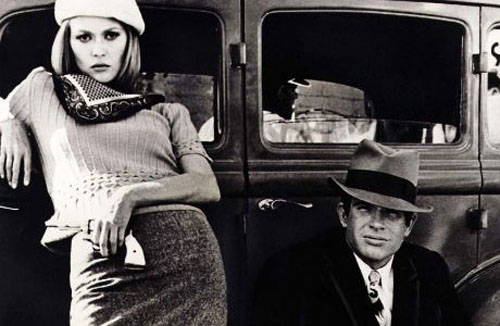By Michael Wilmington & Film Noir Blonde
The Noir File is FNB’s guide to classic film noir, neo-noir, sort of noir and pre-noir on cable TV. All movies below are from the schedule of Turner Classic Movies (TCM), which broadcasts them uncut and uninterrupted. The times are Eastern Standard and (Pacific Standard).
PICK OF THE WEEK
“Bonnie and Clyde“ (1967, Arthur Penn). Monday, Feb. 4, 8 p.m. (5 p.m.). It begins with a sexy small town pickup – a fast-talking ex-con named Clyde Barrow (Warren Beatty) talks a bored blonde waitress named Bonnie Parker (Faye Dunaway) into taking a stroll, witnessing an armed robbery, and then taking a spin in a stolen car that he steals right in front of her. It ends with one of the most emotionally overpowering scenes in all of the movies. In between, we watch Bonnie, Clyde, Clyde’s cornball brother Buck (Gene Hackman), Buck’s wife Blanche-the-preacher’s-daughter (Estelle Parsons) and a wayward gas station jockey named C. W. Moss (Michael J. Pollard), run amok in the south and middle west, often accompanied by banjo picker Earl Scruggs’ rousing “Foggy Mountain Breakdown,” in one of the movies’ great crime sprees and gang sagas.
Among the inspirations for Robert Benton and David Newman’s script, which they intended for one of the ‘60s French New Wave directors, like Francois Truffaut or Jean-Luc Godard, were the ’40s love-on-the run film noirs “Gun Crazy” and “They Live By Night,” two classics also based on the legend of The Barrow Gang. Director Arthur Penn, at his peak, turned the movie into an ironic blend of twisted love story, dark comedy, caustic social portrait and breezy romantic crime thriller, with Bonnie and Clyde as a pair of deadly innocents, caught up in the poverty of the Depression and the turbulence of the ’30s gangster period. The movie is shot by Burnett Guffey in a style reminiscent of Depression-era photographer Walker Evans.
Gun-toting Bonnie and Clyde are sociopathic criminals but attractive, likable, mostly unmalicious ones. (Beatty’s Clyde believes naively that they’re helping the poor by robbing banks that are foreclosing mortgages.) Bonnie and Clyde are also, in a way, counter-culture stars – creating their own real-life movie as they race along. What they’re racing toward, though – something poetess Bonnie realizes – is the end of the line. With Gene Wilder, Denver Pyle and Dub Taylor. Oscars went to Parsons (Supporting Actress) and Guffey (Cinematography).
Monday. Feb. 4
12:15 a.m. (9:15 p.m.): “Bullitt” (1968, Peter Yates). With Steve McQueen and Jacqueline Bisset. Reviewed on FNB, Oct, 17, 2012
Wednesday, Feb. 6
10 a.m. (7 a.m.): “Lolita” (1962, Stanley Kubrick). With James Mason, Peter Sellers and Sue Lyon. Reviewed on FNB, Aug. 10, 2012.
1 p.m. (10 a.m.): “Whatever Happened to Baby Jane?” (1962, Robert Aldrich). Reviewed on FNB, July 28, 2012
4 a.m. (1 a.m.): “The Naked City” (1948, Jules Dassin). This tense, fact-based crime drama shows cops Barry Fitzgerald and Howard Duff investigating a murder (with Duff as the chief suspect) through naked New York City. It’s mix of neo-realism and noir, and also, thanks to director Dassin and cinematographer William Daniels (“Greed“), one of the prime NYC location films.
Thursday, Feb. 7
3:30 p.m. (12:30 a.m.) “Big Deal on Madonna St.” (1958, Mario Monicelli). With Vittorio Gassmann and Marcello Mastroianni. Reviewed on FNB, Jan. 1, 2013.
Saturday, Feb. 9
2 p.m. (11 a.m.): “No Way Out” (1950, Joseph L. Mankiewicz). Sidney Poitier is a young doctor forced to tend a crook: Richard Widmark as a racially prejudiced mob guy and hate-monger. An early Poitier good guy part (his movie debut) clashing with Widmark at his meanest.











From FNB readers